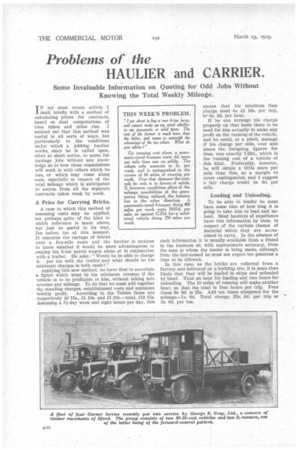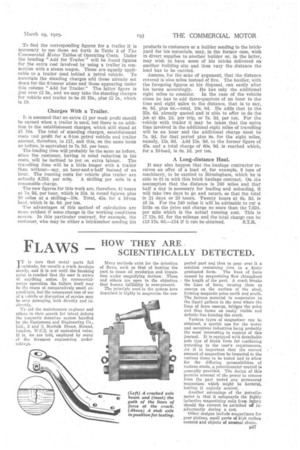Problems of the HAULIER and CARRIER.
Page 72

Page 73

If you've noticed an error in this article please click here to report it so we can fix it.
Some Invaluable Information on Quoting for Odd Jobs Without Knowing the Total Weekly Mileage.
INmy most recent article I dealt briefly with a method of calculating prices for contracts, based on dual computations of time taken and miles run. I nointed out that this method was useful in all sorts of ways, but particularly to the conditions under which a jobbing haulier works, since he is called upon, often at short notice, to quote for haulage jobs without any knowledge as to how these commissions will work in with others which he has, or which may come along soon, especially in respect of the total mileage which is anticipated to accrue from all the separate contracts taken week by week.
A Price for Carrying Bricks.
A case to which this method of assessing costs may be applied, not perhaps quite of the kind to which reference is made above, hut just as useful in its way,
lies before me at this moment. It concerns the cartage of bricks over a five-mile route and the haulier is anxious to know whether it would be more advantageous to employ his 6-ton petrol wagon alone or in conjunction with a trailer. He asks: "Would he be able to charge In per ton with the trailer and what should be his minimum charges in both cases?"
Applying this new method, we have first to ascertain a figure which must be his minimum revenue if the vehicle is to be profitable to him, without taking into account any mileage. To do that we must add together thi: standing charges, establishment costs and minimum weekly profit. According to the Tables these are respectively £6 15s., £1 10s. and £5 .10s.—total, £13 15s. Assuming a 51-day week and eight hours per day, this means that his minimum time charge must be £2 10s. per day, or (is. 3d. per hour.
If he can arrange his charge properly on that basis there is no need for him actually to make any profit on the running of the vehicle, and he could, at a pinch, manage if his charge per mile, over and above the foregoing figures for time, was exactly 7.62d., which is the running cost of a vehicle of this kind. Preferably, however, he will obtain a little more per mile than this, as a margin to cover contingencies, and I suggest a fair charge would be 9d. per mile.
Loading and Unloading.
To be able to tender he must have some idea of how long it is going to take him to load and unload. Most hauliers of experience have this information by them in respect of the various classes of material which they are accustomed to carry. In the absence of such information it is usually available from a friend in the business or, with approximate accuracy, from the man to whom the tender is being made, although from the last-named he must not expect too generous a time to be allowed.
In this case, as the bricks are collected from a factory and delivered on a building site, it is more than likely that they will be loaded in skips and unloaded by hand. Take an hour for loading and two hours for unloading. The 10 miles of running will make another hour, so that the total is four hours per trip. Four times 6s. 3d. is 25s. Add ten times ninepence for the mileage-7s. 6d. Total charge, 32s. 6d. per trip or • 5s. 6d. per ton.
To find the corresponding figures for a trailer it is necessary to use those set forth in Table 3 of The Commercial Motor Tables of Operating Costs. Under the heading "Add for Trailer" will be found figures for the extra cost involved by using a trailer in connection with a steam wagon. These are equally applicable to ott trailer used behind a petrol vehicle. To ascertain the standing charges add those already set down for the 6-tonner alone and those appearing under this column "Add for Trailer." The latter figure is just over £2 5s., and we may take the standing charges for vehicle and trailer to be f6 15s., plus £2 5s., which is £9.
Charges With a Trailer.
It is assumed that an extra £1 per week profit should he earned when a trailer is used, but there is no addition to the establishment charges, which still stand at £1 10s. The total of standing charges, establishment costs and profit for a 6-ton petrol vehicle and trailer amount, therefore, to £17, and this, on the same basis as before, is equivalent to 7s. 9d, per hour.
The loading time will probably be the same as before, since the customer, having in mind reduction in his
costs, will be inclined to put on extra labour. The travelling time will be a little longer with a trailer than without-say, an hour-and-a-half instead of an hour. The running costs for vehicle phis trailer are actually 8.22d. per mile. • A shilling per mile is a reasonable charge.
The new figures for this work are, therefore, 41 hours at 7s. 9d. per hour, which is 35s. in round figures. plus 10 miles at a shilling-10s. Total, 45s. for a 10-ton load, which is 4s. 6d. per ton.
The advantages of this method of calculation are more evident if some change in the working conditions occurs. In this particular contract, for example, the customer, who may be either a brickmaker sending his
products to customers or a builder sending to the brickyard for his materials, may, in the former case, wish to divert supplies to another builder or, in the latter, may wish to have some of his bricks delivered on another building site and thus vary the distance the load has to be carried.
Assume, for the sake of argument, that the distance covered is nine miles instead of five. The haulier, with the foregoing figures at his disposal, can easily alter his terms accordingly. He has only the additional eight miles to consider. In the case of the vehicle alone he has to add three-quarters of an hour to the time and eight miles to the distance, that is to say, 4s. 8d. plus 6s.-total, 10s. 8d. He adds that to the 32s. Gd. already quoted and is able to offer to do the job at 43s. 2d. per trip, or 7s. 3d. per ton. For the 'vehicle with trailer it may be taken that the extra time involved in the additional eight miles of travelling will be an hour and the additional charge must be 78. 9th for that period plus 8s, for the eight miles, namely, 15s. 9d. Add 15s. 9th to the former figure of 45s. and a total charge of 60s. 9d. is reached which, for a 10-load, is 6s. Id. per ton.
A Long-distance Haul.
It may also happen that the haulage contractor receives an offer of a load of, for example, 6 tons of machinery, to be carried to Birmingham, which he is able to fit in with this brick haulage contract. On the assumption that the distance is 240 miles and that half a day is necessary for loading and unloading, it will take two days to go and return, so that the total is 21 days or 20 hours. Twenty hours at 6s. 3d. is £6 5s. For the 240 miles it will be advisable to cut a little on the price and charge no more than the 7.62d. per mile which is the actual running cost. This is £7 12s. 6d. for the mileage and the total charge can be £13 17s. 6d.-£14 if it can be obtained. ST.&




















































































































